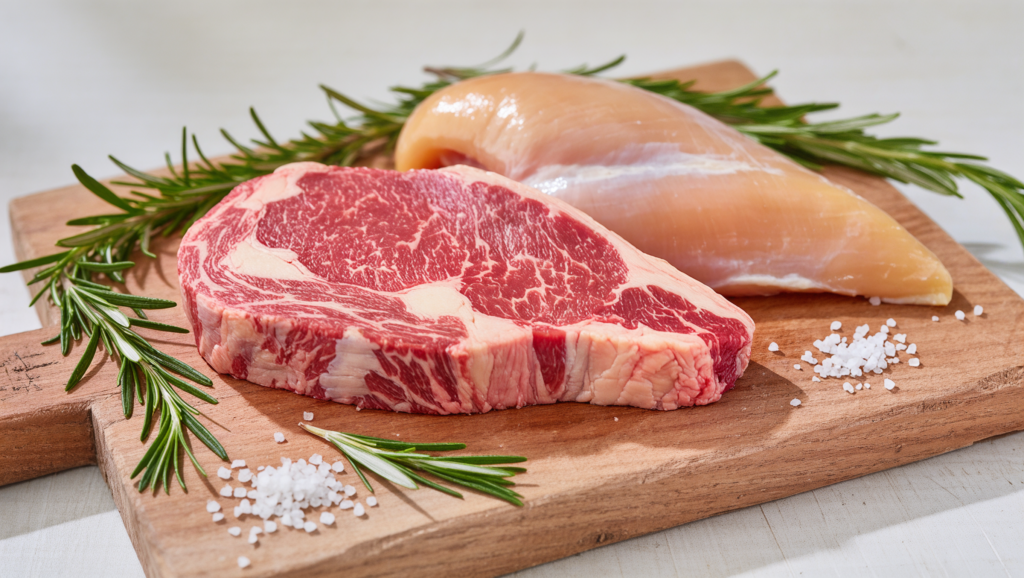Let’s cut right to the steak: The carnivore diet—eating only animal-based foods—has exploded in popularity among biohackers, paleo warriors, and anyone tired of counting carbs or meticulously blending green smoothies. If you’ve been eyeing that ribeye and wondering if “meat-only” could be the ultimate health hack, or whether splurging on organic, grass-fed options matters, you’re in the right place. Here’s everything you need to know about this trending diet, its health impacts, and why organic may just be the unrivaled upgrade your body’s craving.
What is the Carnivore Diet, Really?
What’s on your shopping list?
At its core, the carnivore diet is extreme in its simplicity. You eat only animal products: meat, fish, eggs, and (for some) select dairy. Plants, grains, fruits, veggies, legumes, nuts, seeds? Outta here. This approach, also championed as the “zero carb” diet, draws its energy almost solely from protein and fat, particularly from red meats, organ meats, seafood, and eggs.
- Beef (steaks, roasts, burgers)
- Pork, lamb, and game meats
- Poultry (chicken, duck, turkey)
- Fish and shellfish
- Eggs
- Animal fats (tallow, lard)
- Optional: hard cheeses, heavy cream, butter
No, you can’t have your coffee—at least not on the strictest versions.
Why would anyone do this? Proponents believe that stripping away all plants removes “anti-nutrients,” allergens, and complicated digestion, leading to weight loss, mental clarity, and less inflammation. The carnivore diet is also the most ketogenic of all low-carb diets, sending your body deep into fat-burning mode (ketosis) by eliminating basically all dietary carbohydrates.
The (Alleged) Benefits: What Do Carnivore Followers Say?
1. Weight Loss & Metabolic Health
Zero carbs = low insulin = burning more fat for energy. Many experience rapid early weight loss (often water, but some fat, too), and some report easier appetite control.
2. Stable Energy & Focus
No sugar spikes, no crashes—a steady fuel supply from fat and protein. Some carnivores boast of eliminating “brain fog” and maintaining energy all day.
3. Improved Digestion & Less Bloating
Eliminating fermentable fibers and plant-based compounds eliminates bloating and gas for some. People with IBS or other gut sensitivities sometimes claim “miraculous” improvements.
4. Reduced Inflammation
Cutting out processed foods, sugars, and grains may reduce joint pain and inflammation (but keep reading—the picture isn’t simple).
5. Muscle Maintenance & Hormone Support
Nutrient-dense animal proteins support muscle repair and essential hormones, including testosterone, thanks to the cholesterol and fat content.
6. Mental Health Benefits
Some case reports and community surveys suggest mood improvements, reduced anxiety, and help with neurological conditions—though rigorous science here is thin.
The Science (And the Skepticism): Weighing the Risks
Before you trade your salad for steak tartare, know that the carnivore diet isn’t backed by most health organizations—and science mostly waves a red flag:
High in Saturated Fat
Animal-based diets are typically high in saturated fat, which can spike LDL (“bad”) cholesterol and increase the risk of heart disease for some people. Even higher-quality or organic meat is not free from saturated fats.
Zero Dietary Fiber
No plants = no fiber. Fiber is linked to lower risk of colon cancer, better digestion, and improved metabolic health. Fiber’s absence may lead to constipation and risks for colon health in the long-term.
Nutrient Shortfalls
Carnivore dieters risk missing key vitamins and minerals found in plant foods—like vitamin C, K, folate, and many phytonutrients crucial for long-term wellbeing.
Gut Microbiome Impacts
A meat-only diet alters the gut microbiome, often reducing beneficial species associated with health, immunity, and lower inflammation.
Kidney and Liver Stress
High protein puts heavy demands on the kidneys and liver, increasing the risk for kidney stones and gout, particularly for those with pre-existing issues.
Cancer Risk
Long-term diets high in red and processed meat (especially cheap, conventionally raised meat) have been linked to higher rates of colon and rectal cancer.
Bottom line: While some anecdotal reports sound miraculous, most doctors don’t recommend the carnivore diet for more than a short-term metabolic reset—and it’s definitely not a one-size-fits-all approach.
Why Organic and Grass-Fed Meat Might Be the Missing Link
Here’s the carnivore upgrade that few pay enough attention to: not all meat is created equal! If you’re eating large quantities of meat, the quality matters more than ever.
What Does “Organic” Mean?
- No antibiotics or growth hormones allowed in raising the animals
- No synthetic pesticides or chemical fertilizers used in growing their feed
- Access to outdoors & humane conditions often required (for organic and especially pasture-raised)
- Livestock fed 100% certified organic feed (and, for grass-fed, natural grass—not grain)
This is stricter than “natural” labeling, which has far fewer legal requirements.
Grass-Fed, Pasture-Raised, and Ethical Sourcing: The Gold Standard
Grass-fed or pasture-raised beef means animals graze free on real pasture instead of confined grain feeding. This delivers:
- More omega-3 fatty acids: Healthier fats linked to less inflammation and better heart and brain health
- Lower omega-6: Better omega-3/6 ratio compared to grain-fed, often tied to reduced chronic inflammation
- More vitamins A, D, E, and K2: Essential for immunity, cardiovascular function, and bone health
- Higher levels of CLA (conjugated linoleic acid): A fatty acid linked to fat loss, metabolism, and potential heart protection
- Cleaner meat: Fewer contaminants, hormones, residual antibiotics, and synthetic additives
Why Does This Matter More on Carnivore?
If you’re eating meat as a small part of a diverse diet, occasional conventional cuts might not be a big deal. But if it’s all you eat (and a LOT of it), the cumulative effect of growth hormones, antibiotic residues, pesticides, and inflammatory fat composition is much bigger.
Choosing organic, grass-fed, and ethically sourced meat ensures:
- You’re not overloading your body with toxicants or pro-inflammatory compounds
- You maximize your nutrient density—think more iron, B vitamins, zinc, and healthy fats per bite
- You support digestive and metabolic health by avoiding unnecessary chemical exposures
- Better animal welfare and environmental impact
Organic vs. Conventional: Quick Comparison
| Aspect | Organic/Grass-Fed Meat | Conventional/Grain-Fed Meat |
|---|---|---|
| Antibiotics, hormones | Not allowed in feed or animals | Common in feed and treatments |
| Feed quality | 100% organic (no pesticides/fertilizers); grass in “grass-fed” | Often GMO grain/corn/soy, chemical fertilizers |
| Fatty acid profile | Higher in omega-3s, CLA, vitamins A, E, K2 | Higher omega-6, lower omega-3, fewer nutrients |
| Toxins/chemicals | Minimal | Greater risk: pesticides, toxins |
| Animal welfare | Typically better (outdoor access) | Often confined, less humane |
| Environmental impact | Lower, better for soil health | Higher, soil and water pollution |
Why Eating Clean Meat Matters for You And the Planet
- Personal Health: Fewer contaminants, better nutrition, improved fat quality
- Planet Health: Supports farming with a lower carbon footprint, reduced chemical use, & regenerative soil
- Ethics: Animals raised more humanely, natural foraging, less confinement
How to Go Organic Carnivore—Practical Tips
- Source wisely: Visit farmers markets, specialty butchers, or join meat-shares. Look for certifications: USDA Organic, “100% Grass-Fed” or “Pasture-Raised.”
- Mix your meats: Eat nose-to-tail for maximum nutrients—include organ meats, wild fish, and eggs (from pasture-raised hens).
- Read labels: “Natural” does not mean organic! Only official certification guarantees standards followed.
- Watch your portion sizes: Even the healthiest red meat should be enjoyed in moderation, especially at the start.
- Budget strategies: If you’re on a budget, focus on ground organic meats, stew cuts, or bones for broths—they’re cheaper but as nutritious.
The Final Cut: Does the Carnivore Diet Work—And Should You Go Organic?
The carnivore diet is divisive. Some folks report transformative results, particularly in the short term: weight loss, improved mental clarity, and even relief from autoimmune conditions. But the long-term health evidence is ambiguous at best, and there are real, researched risks: higher cholesterol, fiber deficiency, potential kidney and heart strain, and missed plant-based nutrients.
But if you’re going to do it, going organic and grass-fed is more than a lifestyle flex—it’s a health investment. Quality matters more than ever when your diet is all meat. You reduce toxins, eat a cleaner fat profile, support better animal welfare, and, yes, help the environment just a bit.
If you’re flirting with carnivore, make it sustainable—for you, the animals, and planet Earth. That’s how you make this bold diet more than just a passing trend. And don’t forget to listen to your body—and your doctor. Sometimes, the best dietary hack is moderation.
References








